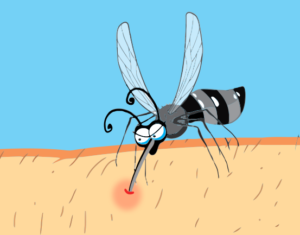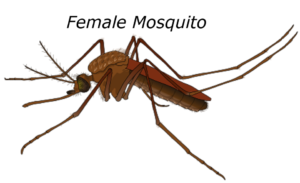
New Relief from Mosquito Bites
For the 20% of the population who are more susceptible to being bitten by mosquitoes than the average person, here’s some very good news.
A new repellent shows great promise in preventing mosquito bites by up to 80%. It is made from combining a renewable raw material found in cotton and wood, called cellulose nanocrystals (CNC), and indole, an organic compound that has an unpleasant smell.
This new substance is “based on cellulose, an abundant biological molecule, readily available in wood industry waste as well as local food and paper waste. Treating cellulose with sulfuric acid prompts the molecule to assemble into cellulose nanocrystals, which then self-assemble into strong, transparent barrier films. Mixed with water and a small amount of glycerol [a naturally occurring alcohol that is colorless, odorless, sweet-tasting, and non-toxic], the nanocrystals can be applied to the skin like a gel,” as described by Phys.org, the online science, research, and technology website.
Applying a thin coating of this repellent on human skin decreased the number of mosquitoes feeding by 80%, according to a study published in PNAS Nexus.
As stated in the journal article, because “mosquitoes are the deadliest of all combined insects and animals affecting millions and killing hundreds or thousands of people each year,” the new coating’s effectiveness is significant news. The barrier properties of the CNC decreased the feeding on human skin by 80% when a thin layer was applied. What’s more, the scientists at the Hebrew University of Jerusalem, who developed the repellent, also fed the mosquitoes with the CNC and found that those mosquitos had a “significant” reduction in laid eggs. When the indole was added, the “coating led to the most effective egg reduction effect … with a dramatic 99.4% reduction in eggs. It combines both the chemical camouflage provided by the CNC and the active chemical repellent that is indole.”
The multinational pharmaceutical and biotechnology corporation Pfizer has established that various determinants make some people more attractive to mosquitoes. These range from the organic compounds healthy people emit in their breath (including isoprene, acetone, ethanol, methanol, and other alcohols), to the bacteria, fungi, and viruses that reside on human skin (called the skin microbiota), to blood type (type O is mosquitoes’ preferred type) or body temperature. Even the color of the clothing a person is wearing makes a difference; the insects seem to like red, orange, and black the best, as stated in at least one study. Basically, it seems that natural body odor and genetics are largely responsible for the tendency to be stung.
Since mosquitoes transmit many parasitic diseases, such as zika, malaria, yellow fever, and chikungunya, this promising coating against mosquito bites will undergo further human studies with a view to getting regulator approval to bring the substance to market.
 But until this protection is approved, here are some home remedies to help stop the itching, courtesy of UnityPoint Health:
But until this protection is approved, here are some home remedies to help stop the itching, courtesy of UnityPoint Health:
- Ice. The cold causes constriction of blood vessels, reducing flow to the area. It’ll reduce swelling and itching.
- Oatmeal. It can relieve both itching and swelling due to the oats’ compounds (avenanthramides and polyphenols). Applying it can be difficult but try mixing it with equal parts water and whipping into a paste. Apply to the bite and leave it on for at least 10 minutes.
- Honey. It’s been found by researchers to have soothing properties. By applying a small drop, it’ll reduce swelling and aid in healing and preventing infection.
- Aloe Vera. The gel contains hormones (called auxins and gibberellin) that help heal wounds, soothe irritation and reduce inflammation. Use aloe from the store or open a small section of the plant and apply directly to your bite.
- Onions. Quercetin (plant pigment) found in onions can act as a powerful anti-inflammatory. When eaten, they can also prevent cells from releasing histamine. (This is the process initiated when bitten by the mosquito.) Grab an onion, slice it open and apply it directly to the bite. Once you notice relief, rinse the area well.
- Garlic. While it contains both antiseptic and antibacterial properties, it can also be used to minimize inflammation and soothe skin. When crushed or chopped, the active ingredient (allicin) is released. Unfortunately, allicin is also the reason garlic smells so strong. To reduce the stench, try mixing the crushed pieces with your favorite smelling essential oil or even coconut oil before applying to the bite.
- Essential Oils. These can be used to soothe itching and decrease swelling. Basil, thyme, peppermint, lavender, clove, geranium, white camphor and citronella oils are all good choices for mosquito bites.
- Toothpaste. The active ingredients of menthol and baking soda relieve itching, soothe irritation and reduce inflammation.
- Witch Hazel. This product causes contraction of the skin, leading to a reduction in inflammation and a soothing sensation. You can purchase this product as pads or liquid and apply it as often as needed.



This is GREAT news. I can’t wait for CNC to become available for use.